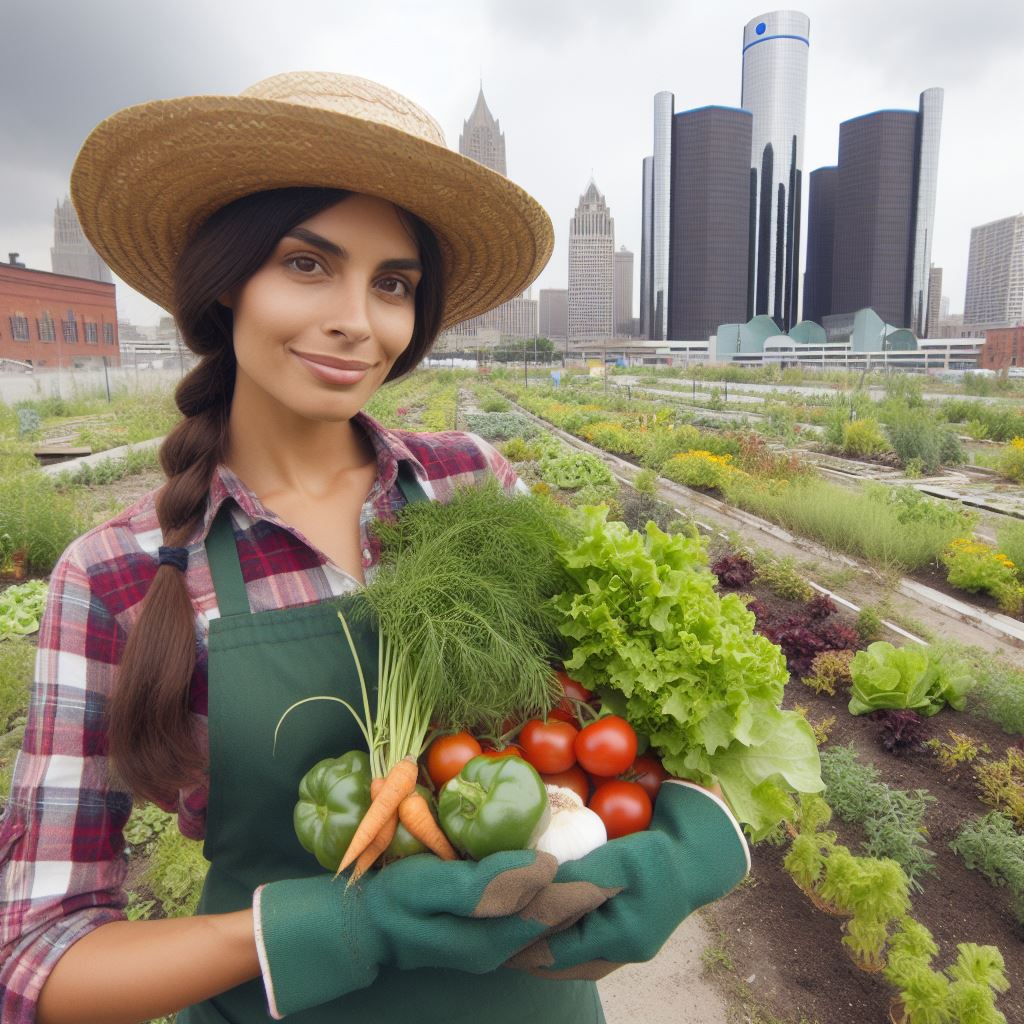Introduction
Detroit Green Urban Farm Makeover the City farming transformation movement in the city of Detroit flourishes, turning empty lots into verdant areas once filled with abandoned structures and neglected terrain.
Spearheaded by passionate individuals and community organizations, this movement has gained momentum, bringing life and purpose to areas long forgotten by traditional development initiatives.
Detroit’s green makeover signifies more than just aesthetic transformation.
It represents a profound shift towards revitalization, sustainability, and community empowerment.
By reclaiming unused urban spaces for agriculture, Detroit is not only addressing issues of food insecurity but also fostering economic opportunities and strengthening social ties within neighborhoods.
The significance of detroit green urban farm makeover urban extends beyond the city limits, serving as a beacon of hope and inspiration for other urban areas grappling with similar challenges.
It demonstrates that innovative solutions can emerge from adversity and that communities possess the resilience and creativity to chart their own path towards a brighter future.
Moreover, Detroit Green Urban Farm Makeover embrace of urban farming reflects a growing awareness of the interconnectedness between environmental health and human well-being.
By prioritizing green spaces and sustainable practices, the city is not only mitigating the impacts of climate change but also improving air and water quality, enhancing biodiversity, and promoting overall public health.
Furthermore, Detroit’s urban farm movement is fostering a deeper sense of connection to the land and food systems, empowering residents to reclaim agency over their food sources and dietary choices.
Through educational programs, farmers’ markets, and community gardens, individuals are learning valuable skills, cultivating a sense of pride in their local food systems, and fostering a renewed sense of belonging within their neighborhoods.
In essence, detroit green urban farm makeover urban represents a paradigm shift in how we perceive and interact with urban environments.
It underscores the potential for cities to become more sustainable, equitable, and resilient through the power of grassroots initiatives and collective action.
Urban farming potential in Detroit
The abundance of vacant land in the city
Detroit, once a bustling industrial center, now grapples with vast tracts of abandoned lots and buildings.
These vacant lands offer a unique opportunity for urban farming initiatives to take root.
The city has around 24 square miles of vacant land, equivalent to about 40% of its total area.
These abandoned spaces can be turned into gardens, farms, and green spaces, revitalizing the city.
Urban farming provides a sustainable solution to repurpose these empty lots and transform them into productive spaces.
Residents and community organizations can lease or purchase this land from the city for agricultural purposes.
Urban farming can address food insecurity
Detroit is a city that faces food insecurity, with limited access to fresh and healthy food options.
Urban farming can play a crucial role in addressing this issue by increasing food production within the city itself.
By cultivating crops locally, urban farmers can provide fresh produce to neighborhoods lacking grocery stores or farmers’ markets.
Transform Your Agribusiness
Unlock your farm's potential with expert advice tailored to your needs. Get actionable steps that drive real results.
Get StartedResidents can have access to nutritious food options grown just a few blocks away, improving their quality of life.
Urban farms can also educate communities about healthy eating habits and encourage self-sufficiency.
The economic benefits for local communities
Apart from addressing food insecurity, urban farming brings significant economic benefits to local communities.
These farming initiatives create job opportunities, particularly for residents with limited employment prospects.
Farmers markets and community-supported agriculture programs strengthen the local economy by keeping money within the community.
The sale of surplus produce can also generate income for urban farmers and provide financial stability.
Moreover, urban farming contributes to the green economy, promoting sustainable practices and reducing food miles.
This localized approach helps to minimize environmental impacts while supporting local businesses and entrepreneurs.
In fact, Detroit’s abundance of vacant land presents a promising future for urban farming.
Through repurposing these abandoned spaces, the city can tackle food insecurity, stimulate economic growth, and create thriving communities.
Urban farming has the potential to transform Detroit’s landscape and provide a model for other struggling cities to follow.
Read: 5th Gen Corn Farmers: A Century of Growth
Success stories in Detroit’s urban farming
Description of successful urban farms in Detroit
Earthworks Urban Farm
Earthworks Urban Farm has a mission to provide fresh, nutritious food to the community.
They grow a variety of fruits and vegetables using sustainable practices.
Through their operations, Earthworks Urban Farm has made a significant impact on the community.
They provide job opportunities for local residents, and also offer educational programs and workshops.
The farm has created a sense of community and improved access to healthy food for Detroit residents.
Hantz Farms
Hantz Farms takes a large-scale approach to urban farming in Detroit.
Their goal is to transform vacant lots into productive agricultural land.
With their investment and effort, Hantz Farms has revitalized abandoned neighborhoods.
They have created jobs, stimulated economic growth, and increased property values in the area.
Hantz Farms has successfully contributed to the local economy and improved the quality of life for residents.
Additional success stories and their impact
In Detroit, Earthworks Urban Farm, Hantz Farms, and others thrive, like the Michigan Urban Farming Initiative (MUFI).
MUFI prioritizes sustainability and urban renewal, converting abandoned buildings into green spaces.
Showcase Your Farming Business
Publish your professional farming services profile on our blog for a one-time fee of $200 and reach a dedicated audience of farmers and agribusiness owners.
Publish Your ProfileThey supply fresh produce, transforming communities and abandoned areas into vibrant green spaces.
Detroit Farm and Garden Project, another success, educates, employs, and engages the community.
They train residents in sustainable farming techniques, inspiring them to start their own initiatives.
These farms not only provide food but also foster community pride and unity.
They beautify abandoned spaces, creating hubs for social interaction and engagement.
Urban farms in Detroit significantly improve access to fresh food, create jobs, and stimulate economic growth.
They revitalize communities, instilling hope and empowerment in residents.
Detroit’s urban farming success inspires other cities to embrace sustainability and community investment.
Urban farming catalyzes positive change, greening cities and uplifting residents.
As more cities adopt urban farming, they grow greener, healthier, and more sustainable.
Read: Dairy Dreams: 4 Generations of Care

Challenges and obstacles faced by urban farmers in Detroit
Lack of access to capital and resources
Urban farmers in Detroit often struggle to secure funding and resources needed for their operations.
Without sufficient capital, farmers face difficulties in purchasing necessary tools, equipment, and seeds.
The lack of financial support hinders the growth and expansion of urban farming initiatives in the city.
Securing loans or grants is a major challenge for farmers, as traditional lenders may be hesitant to invest in urban farming projects.
Limited access to capital also prevents farmers from investing in modern technologies for irrigation and energy efficiency.
Issues related to soil quality and contamination
Urban areas in Detroit often suffer from soil contamination due to historical industrial activities.
Contaminated soil poses a significant obstacle for urban farmers as it affects crop quality and safety.
Remediating contaminated soil can be an expensive and time-consuming process, deterring many farmers.
Farmers need access to affordable soil testing and remediation services to ensure the health and viability of their crops.
Soil quality management and education programs are crucial for urban farmers in order to address this challenge effectively.
Limited availability of infrastructure and support systems
The lack of proper infrastructure, such as greenhouses and storage facilities, hampers the productivity and efficiency of urban farms.
Urban farmers struggle to find suitable spaces for their farming operations, given the limited availability of land in Detroit.
The absence of support systems, like distribution networks and marketing assistance, makes it difficult for farmers to reach consumers effectively.
Transportation and logistics challenges impede the timely delivery of fresh produce to local markets and restaurants.
Farmers need access to affordable and reliable agricultural infrastructure and support services to overcome these obstacles.
In short, the urban farming movement in Detroit faces several challenges and obstacles that hinder its growth and success.
The lack of access to capital and resources, soil quality issues, and limited availability of infrastructure and support systems pose significant barriers to urban farmers.
However, with collective efforts from the government, private organizations, and the community, these challenges can be addressed, allowing urban farming to thrive and contribute to the city’s green makeover.
Read: Cattle Ranchers: 100 Years of Heritage
Government initiatives and community involvement
Urban farming in Detroit has experienced a significant transformation in recent years.
This green makeover has not only revitalized abandoned areas but also brought about a sense of community involvement.
The success of this movement can be credited to various government initiatives and active participation from the citizens.
Overview of government programs supporting urban farming
The government has played a crucial role in supporting and promoting urban farming in Detroit.
One notable program is thedetroit green urban farm makeover urban Agriculture Network.
This network of resources, workshops, and educational programs helps aspiring urban farmers navigate the challenges of land acquisition, farming techniques, and marketing.
Through this network, individuals are empowered to transform vacant lots into thriving urban farms.
Another government initiative worth mentioning is the Motor City Match program.
While primarily focused on supporting small businesses, urban farming is also eligible for grants and loans through this program.
This financial assistance has enabled urban farmers to expand their operations and invest in necessary equipment, ultimately increasing their chances of success.
The role of nonprofit organizations in community engagement
Nonprofit organizations have also been instrumental in fostering community engagement and support for urban farming.
These organizations play an active role in connecting farmers with local residents and create platforms for education and awareness.
They help bridge the gap between urban farming and the community, ensuring that the benefits of fresh produce and sustainable farming practices are accessible to all.
Community gardens and volunteer efforts
Community gardens serve as tangible expressions of urban farming involvement, offering spaces for growing food and fostering education and collaboration among residents.
These shared spaces not only enable individuals to cultivate their own produce but also serve as hubs for learning and cooperation.
Residents actively come together to exchange knowledge, share resources, and support each other’s agricultural endeavors, contributing to the success and vibrancy of these gardens.
Volunteers play a crucial role in maintaining and developing these community gardens, dedicating their time and skills to ensure their continued growth and productivity.
Their efforts are instrumental in sustaining the success of these shared spaces, showcasing the power of collective action and community engagement in urban farming initiatives.
The collaborative efforts between government initiatives, nonprofit organizations, and community volunteers have been pivotal in fostering a thriving urban farming community in Detroit.
By working together, these stakeholders have revitalized abandoned areas, addressed issues of food scarcity, and promoted access to fresh, locally grown produce within the city.
Beyond mere food production, urban farming has cultivated a sense of pride and engagement within Detroit’s communities.
Residents actively participate in the cultivation of their neighborhoods, fostering a deeper connection to their surroundings and promoting a sense of ownership over their shared spaces.
Moreover, the urban farming movement has created opportunities for entrepreneurship and economic development in Detroit.
Local farmers can sell their produce at farmers’ markets and establish partnerships with restaurants and businesses, contributing to the economic vitality of the city.
In summary, the success of detroit green urban farm makeover urban can be attributed to the collaborative efforts of government initiatives, nonprofit organizations, and community volunteers.
Together, they have transformed Detroit into a city known for its thriving urban farming community and sustainable practices.
Read: Soybean Saga: A Family’s Field History
Benefits beyond food production
The transformation of Detroit into a city with flourishing urban farms has brought numerous benefits beyond just food production.
These benefits can be categorized into environmental advantages and social/health benefits for the city and its residents.
Showcase Your Farming Business
Publish your professional farming services profile on our blog for a one-time fee of $200 and reach a dedicated audience of farmers and agribusiness owners.
Publish Your ProfileUrban farming in Detroit has significantly reduced food miles and the carbon footprint associated with transporting produce from distant rural areas.
By bringing food production closer to consumers, urban farming decreases the reliance on long-distance transportation networks.
This reduction in transportation-related emissions contributes to a greener and more sustainable city.
In addition, Detroit’s urban farms play a crucial role in reducing the urban heat island effect.
The city’s vast concrete surfaces absorb and retain heat, leading to higher temperatures in urban areas compared to surrounding rural regions.
By introducing green spaces through urban farming, the farms help cool down the city and mitigate the heat island effect.
The presence of urban farms also contributes to stormwater management and improved air quality.
Urban farms act as natural filters, reducing stormwater runoff and preventing pollutants from entering waterways.
Moreover, plants and trees in urban farms absorb carbon dioxide and release oxygen, leading to cleaner and fresher air for Detroit residents.
Environmental advantages of urban farming
Aside from environmental advantages, Detroit’s urban farming movement brings numerous social and health benefits to the city’s residents.
The availability of fresh and affordable produce through urban farms enhances food security and promotes healthier eating habits among the population, combating issues like food deserts and poor nutrition.
Moreover, detroit green urban farm makeover urban farming in Detroit creates job and training opportunities for local residents.
As these farms expand, the demand for skilled workers in various agricultural and related sectors increases.
This expansion leads to employment prospects and economic growth within the community, positively impacting Detroit’s overall socio-economic landscape.
Social and health benefits for Detroit residents
One often overlooked benefit of urban farming is the sense of community it fosters.
The establishment of urban farms brings people together, creating opportunities for social interaction and community engagement.
Residents take pride in their farms, working together to maintain and nurture the green spaces.
This enhanced community engagement instills a sense of belonging and unity among Detroit residents.
In closing, the green makeover that Detroit has embarked on through urban farming provides a multitude of benefits beyond food production.
From environmental advantages such as reduced food miles and the mitigation of urban heat island effect, to social and health benefits like access to fresh produce and job creation, urban farming has revitalized the city.
Furthermore, it has introduced a sense of community engagement and pride, fostering a stronger and more connected Detroit.
Conclusion
Recap of Detroit’s green makeover through urban farming
Throughout this blog section, we have explored the incredible transformation happening in Detroit through urban farming.
From abandoned lots to flourishing green spaces, the city has embraced a new approach to revitalization.
By converting empty land into productive urban farms, Detroit has not only addressed food security issues but has also created employment opportunities for its residents.
The local community has come together to cultivate crops, foster a sense of community, and promote a sustainable lifestyle.
Emphasis on the potential for continued growth and positive impact
With each passing year, Detroit’s urban farming movement is gaining momentum.
More and more individuals and organizations are recognizing the potential of this green revolution.
The positive impact on the environment, economy, and social fabric of the city cannot be overstated.
As the urban farming movement continues to grow, we can expect to see even greater transformations in Detroit.
The city’s residents are determined to create a thriving and sustainable future, and urban farming plays a crucial role in achieving that goal.
Closing thoughts on the future of urban farming in Detroit
As we conclude this section, we are filled with optimism for the future of urban farming in Detroit.
The city has come a long way in embracing sustainable practices and reinventing its image as an urban oasis.
However, challenges remain, and it is crucial that we continue to support and invest in urban farming initiatives.
By doing so, we can ensure that Detroit’s green makeover continues to flourish, creating a legacy of environmental stewardship and community resilience for generations to come.




